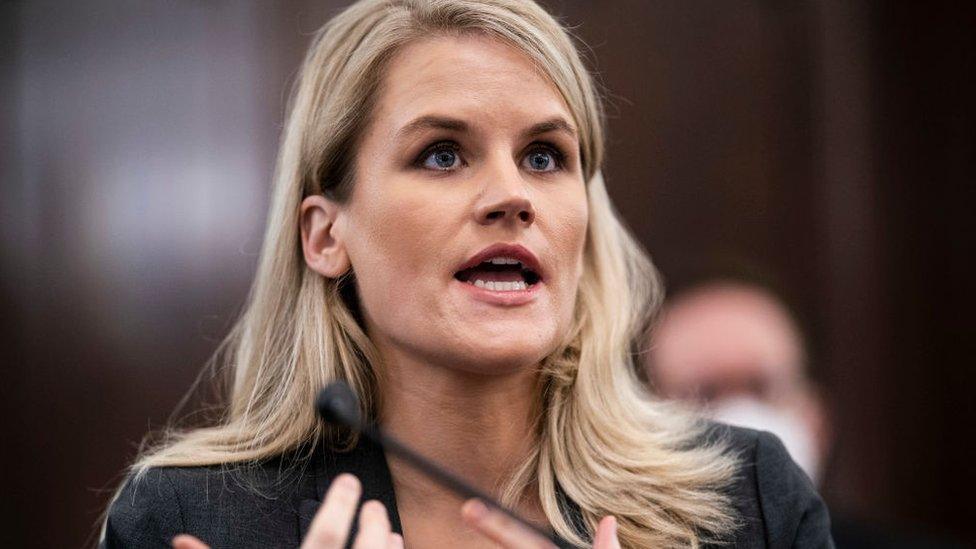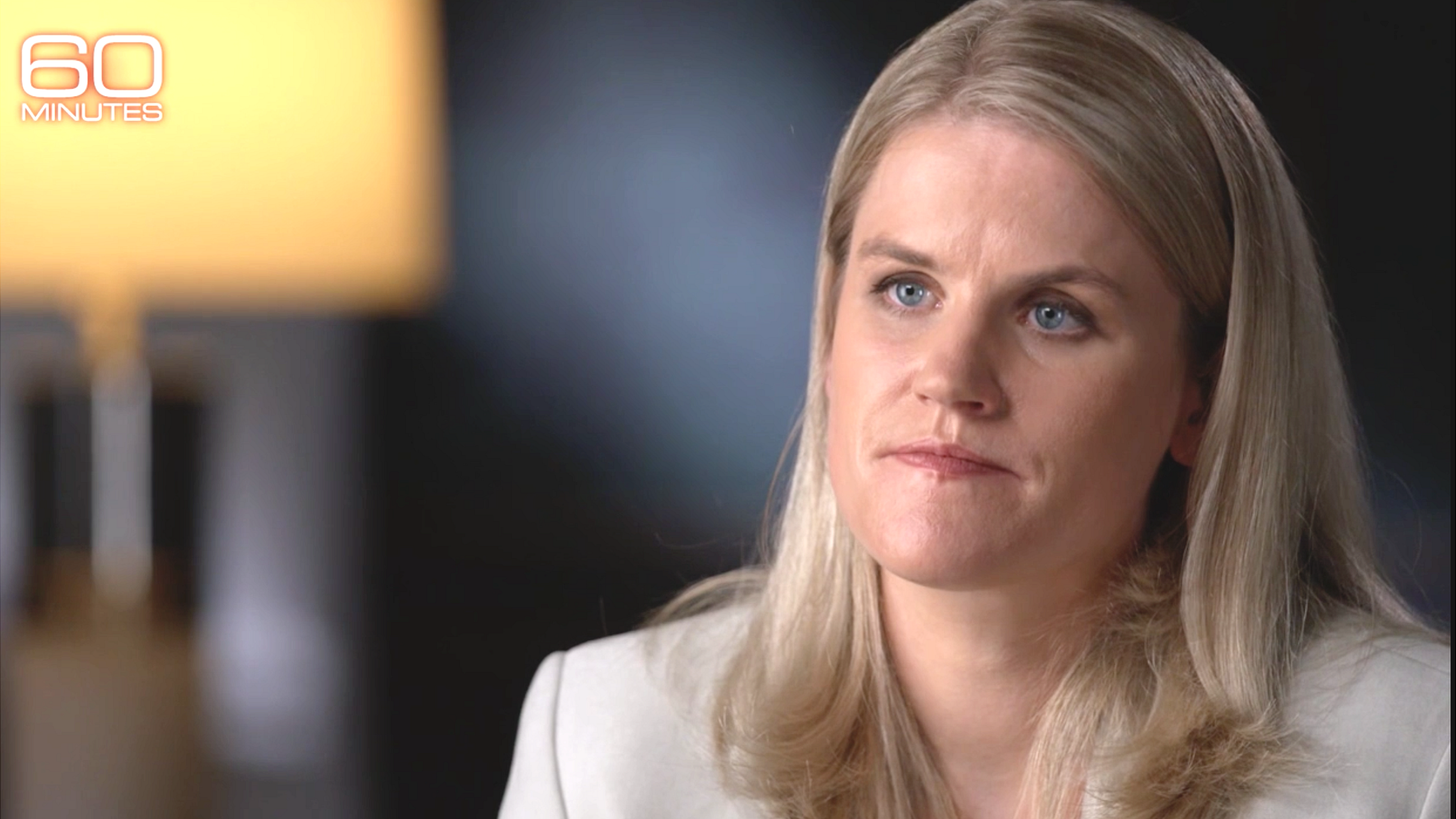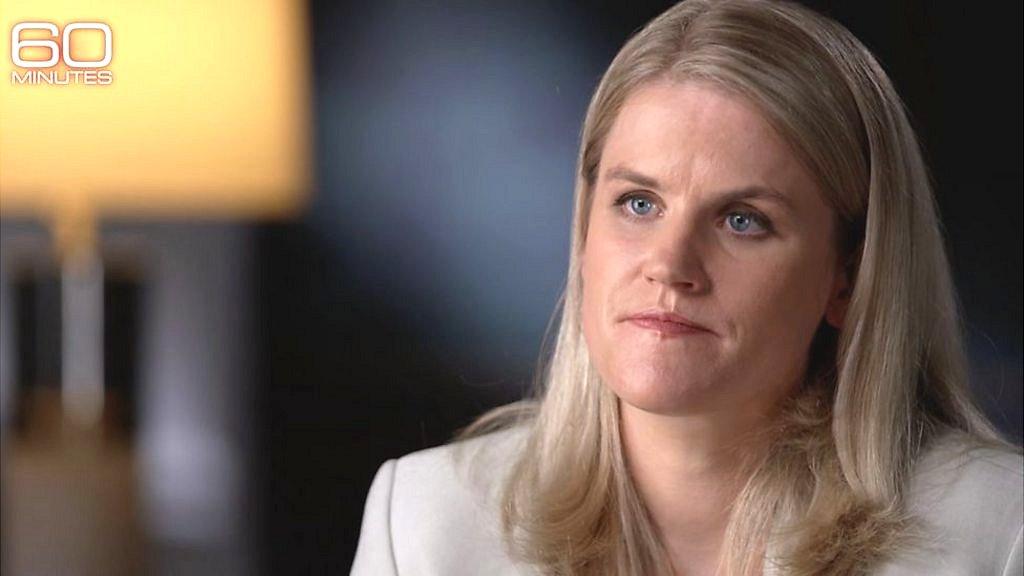Facebook harms children and weakens democracy: ex-employee
- Published
Watch: "The buck stops with Mark"
A former Facebook employee has told US politicians that the company's sites and apps harm children's mental health and stoke division in society.
Frances Haugen, a 37-year-old former product manager turned whistleblower, heavily criticised the company at a hearing in the Senate.
Facebook has faced growing scrutiny and increasing calls for its regulation.
Founder Mark Zuckerberg hit back, saying the latest accusations were at odds with the company's goals.
In a letter to staff, he said many of the claims were "illogical" and pointed to Facebook's efforts to fight harmful content.
"We care deeply about issues like safety, well-being and mental health," he said in the letter, made public on his Facebook page, external. "It's difficult to see coverage that misrepresents our work and our motives."
Facebook is the world's most popular social media site. The company says it has 2.7 billion monthly active users. Hundreds of millions of people also use the company's other products, including WhatsApp and Instagram.
But it has been criticised on several fronts - from failing to protect users' privacy to not doing enough to halt the spread of disinformation.
Ms Haugen told CBS News on Sunday that she had shared a number of internal Facebook documents with the Wall Street Journal in recent weeks.
Using the documents, the WSJ reported that research carried out by Instagram showed the app could harm girls' mental health.
This was a theme Ms Haugen continued during her testimony on Tuesday. "The company's leadership knows how to make Facebook and Instagram safer, but won't make the necessary changes because they have put their astronomical profits before people," she said.
She criticised Mark Zuckerberg for having wide-ranging control, saying that there is "no one currently holding Mark accountable but himself."
Facebook's Monika Bickert says commissioning research into issues shows the company is prioritising safety above profit
And she praised the massive outage of Facebook services on Monday, which affected users around the world.
"Yesterday we saw Facebook taken off the internet," she said. "I don't know why it went down, but I know that for more than five hours, Facebook wasn't used to deepen divides, destabilise democracies and make young girls and women feel bad about their bodies."
The answer, she told senators, was congressional oversight. "We must act now," she said.
Mr Zuckerberg, in his letter, said the research into Instagram had been mischaracterised and that many young people had positive experiences of using the platform. But he said "it's very important to me that everything we build is safe and good for kids".
On Monday's outage, he said the deeper concern was not "how many people switch to competitive services or how much money we lose, but what it means for the people who rely on our services to communicate with loved ones, run their businesses, or support their communities".

Frances Haugen said the company repeatedly prioritised profits over its users safety
Both Republican and Democratic senators on Tuesday were united in the need for change at the company - a rare topic of agreement between the two political parties.
"The damage to self-interest and self-worth inflicted by Facebook today will haunt a generation," Democratic Senator Richard Blumenthal said.
"Big Tech now faces the Big Tobacco jaw-dropping moment of truth," he added, a reference to how tobacco firms hid the harmful effects of their products.
Fellow Republican Dan Sullivan said the world would look back and ask "What the hell were we thinking?" in light of the revelations about Facebook's impact on children.
In a statement issued after the hearing, Facebook said it did not agree with Ms Haugen's "characterisation of the many issues she testified about". But it did agree that "it's time to begin to create standard rules for the internet."
"It's been 25 years since the rules for the internet have been updated, and instead of expecting the industry to make societal decisions that belong to legislators, it is time for Congress to act," the statement read.

Zuckerberg rattled

Mark Zuckerberg's blog is lengthy and thoughtful. He doesn't name Frances Haugen - but he has clearly been rattled.
His main argument is that the research she leaked has been misrepresented by both her and the media. He argues that the negative internal research has been cherry-picked and positive conclusions brushed over.
Interestingly, he thinks this episode could have a chilling effect on internal research in companies - worried that bad conclusions might one day be leaked.
But there is of course a simple come back to this. Release the data.
Facebook and other social media companies don't have to do internal research; they could let their data be analysed independently.
To be fair to Facebook, the company does give researchers some access. However, only Facebook has the full spectrum of user metrics needed to fully analyse its effect on society.
His arguments too are at times overly simplified. Why would we want to make people angry, he asks.
I'm sure he doesn't. But it's been proven over and over again that social media that provokes any emotion, whether it be laughter, love or anger gets more engagement.
Zuckerberg believes passionately that Facebook is a force for good. It's becoming harder and harder to find people on Capitol Hill who think that.
- Published4 October 2021

- Published4 October 2021
